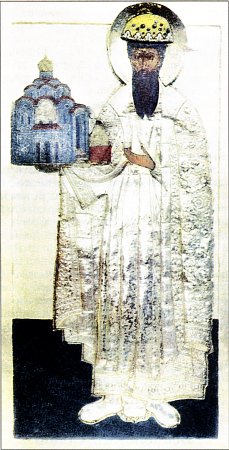
Holy Nobleborn Prince Vsevolod of Pskov, in Baptism Gabriel (Gavriil)
Commemorated on February 11, April 22
Holy Nobleborn
Prince Vsevolod of Pskov, in Baptism Gabriel (Gavriil), a grandson of
Vladimir Monomakh, was born at and spent almost all his life in Novgorod, where
in the years 1088-1093 and 1095-1117 his father ruled as prince. His father was
the holy prince Saint Mstislav-Theodore (Feodor) the Great (+ 15 April 1132). In
the year 1117, when Greatprince Vladimir Monomakh gave Mstislav Kievan Belgorod
as his "udel" (land-holding), practically making him co-ruler, young
Vsevolod remained as vicar of his father in the Novgorod principality.
Holy Prince Vsevolod
did much good for Novgorod. Together with the Archbishop of Novgorod, Saint
Nyphontii (Comm. 8 April), he raised up many a church, among which were – the
cathedral of the GreatMartyr George at the Yur'ev monastery, and the church of
Saint John the Forerunner at Opokakh, built in honour of the "Angel"
(i.e. "patron saint") of his first-born son John, who had died in
infancy (+ 1128). In his Ustav (Law-code) the prince bestowed a grammota-deed
of privileges to the cathedral of Saint Sophia and other churches. During the
time of a terrible famine, to save people from perishing, he exhausted his
entire treasury. Prince Vsevolod was a valiant warrior, he marched victoriously
against the Yam (in 1123) and Chud peoples, but never did he brandish the sword
for lucre or power.

In 1132, upon the
death of holy Greatprince Mstislav, Vsevolod's uncle the Kiev prince Yaropolk
Vladimirovich followed up the last-wishes of his brother and transferred
Vsevolod Pereyaslavl'-South, then reckoned the eldest city after Kiev itself.
But the younger sons of Monomakh – Yurii Dolgoruky and Andrei Dobry, were
apprehensive lest Yaropolk make Vsevolod his successor, and so they marched out
against their nephew. Not wanting internecine strife, Saint Vsevolod returned
to Novgorod, but was received there with disaffection. The Novgorodians
reckoned, that the prince had been "raised" by them and should not
earlier have left them. "Vsevolod did go to Rus', to Pereslavl', – noted
the Novgorod chronicler, – and did kiss the cross against the Novgorodians,
saying, "Ye I would kill"".
Striving to restore
good relations with the Novgorodians, the prince in 1133 undertook a new
victorious campaign against the Chud people, and he annexed Yur'ev to the
Novgorod domain. But an harsh Winter campaign in 1135-1136 against Suzdal'
ended unsuccessfully. The stubborn minded Novgorodians would not heed their
chastisement by God, and they could not forgive the prince their defeat. The
veche-assembly decided to summon a prince from the hostile Monomakh line of the
Ol'govichei, and Saint Vsevolod they condemned to banishment: "Thou didst
suffer banishment from thine own", – is sung in the tropar to the saint.
For a month and an half they held the prince with his family under guard at the
archbishop's palace, and when prince Svyatoslav Ol'govich arrived, "he was
expelled from the city".
Vsevolod went again
to Kiev, and his uncle Yaropolk gave him as holding the Vyshgorod district near
Kiev, – the place where in the X Century during the rule of her son Svyatoslav
had lived holy Equal-to-the-Apostles Greatprincess Olga (Comm. 11 July). Saint
Olga, "well preferring the cities of Kiev and Pskov", came to the
defense of her unrighteously wronged descendant: in the following year of 1137
the people of Pskov, mindful of the campaigns of the Novgorod-Pskov army under
the lead of the prince, invited him to the Pskov principality, the native
region of Saint Olga. This was the first Pskov prince, chosen through the will
of the Pskov people itself.
Among the glorious
works of holy prince Saint Vsevolod-Gabriel at Pskov was the construction of
the first stone church in the Name of the Life-Originating Trinity, replacing a
wooden one from the times of Saint Olga. On the icons of the saint they often
depict him holding a temple "of That Above – the Holy Trinity".
Saint Vsevolod ruled
as prince at Pskov for only a year – on 11 February 1138 he died, at age 46.
All Pskov gathered at the funeral of the beloved prince, and the church singing
could barely be heard over the people's wailing. The Novgorodians, in
retrospect, sent off an archpriest from the Sophia cathedral to take his holy
body back to Novgorod, but the prince had become loatheful of Novgorod, and the
coffin would not move from the spot. Bitterly then did the Novgorod people
bewail and repent in their misfortune, and they then besought to be given but a
small bit of the holy dust "for upholding their city". Through their
prayers fell out a fingernail from the hand of the saint. The Pskov people put
Saint Vsevolod into the temple of the holy GreatMartyr Demetrios. Alongside the
grave they placed the military armament of the prince – shield and sword, in
cruciform shape, with the Latin inscription to wit, – "I give away mine
honour to no one".
On 27 November 1192,
the relics of holy Prince Vsevolod were uncovered and transferred into the
Trinity cathedral, in which a chapel was consecrated in his honour.
On 22 April 1834, on
the first day of Pascha, the holy relics were solemnly transferred into the
main church-area of the cathedral.
The deep spiritual
bond of the city of holy Equal-to-the-Apostles Olga with holy Prince Vsevolod
was never broken: he always remained a Pskov wonderworker. At the siege of
Pskov by Stefan Bathory in 1581, when the fortress walls were already breached
and the Poles were ready to rush into the city, from the Trinity cathedral with
a church procession they brought to the place of battle the holy relics of
Prince Vsevolod, and the enemy withdrew. And with the appearance of the wonderworking
Pskovo-Pechersk Icon (Comm. 1 October), holy Nobleborn Prince Vsevolod-Gabriel
has stood amidst the Heavenly defenders of Pskov.
© 1996-2001 by translator Fr. S. Janos.